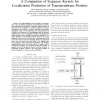Free Online Productivity Tools
i2Speak
i2Symbol
i2OCR
iTex2Img
iWeb2Print
iWeb2Shot
i2Type
iPdf2Split
iPdf2Merge
i2Bopomofo
i2Arabic
i2Style
i2Image
i2PDF
iLatex2Rtf
Sci2ools
121
click to vote
CIBCB
2007
IEEE
2007
IEEE
A Comparison of Sequence Kernels for Localization Prediction of Transmembrane Proteins
Abstract— We applied Support Vector Machines to the prediction of the subcellular localization of transmembrane proteins, and compared the performance of different sequence kernels on this task. More specifically we measured prediction accuracy, computation time, number of kernel evaluations and number of support vectors for the Spectrum, the full Spectrum, the Wildcard, the Mismatch, the Local-alignment and the Residuecoupling kernel. The Local-alignment achieved the highest prediction accuracy, with an Matthews correlation coefficient of 0.51, closely followed by the Mismatch kernel. However, the Localalignment kernel was also the most time consuming kernel and seven times slower than the Mismatch kernel. The Spectrum kernel was the fastest kernel but linked to the highest number of support vectors and kernel evaluations. The Residuecoupling kernel showed the lowest number of support vectors and kernel evaluations. No correlation between the number of support vectors and predicti...
Related Content
| Added | 02 Jun 2010 |
| Updated | 02 Jun 2010 |
| Type | Conference |
| Year | 2007 |
| Where | CIBCB |
| Authors | Stefan Maetschke, Marcus Gallagher, Mikael Bodén |
Comments (0)

